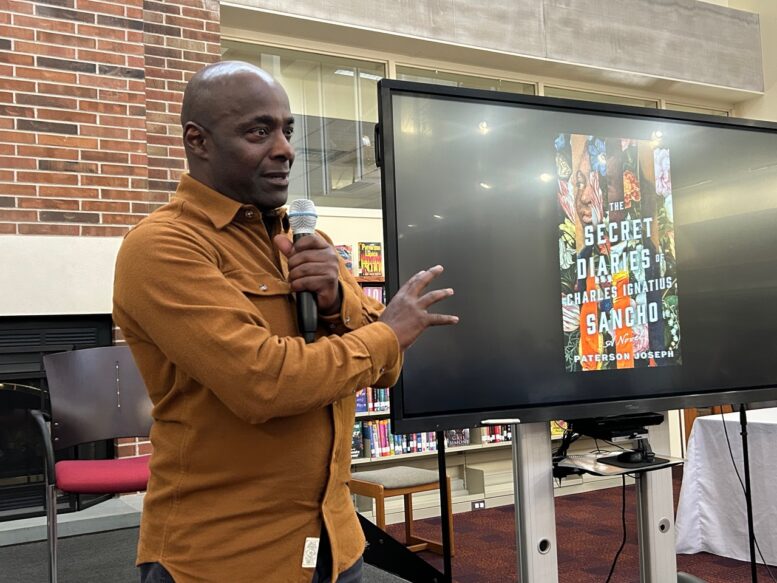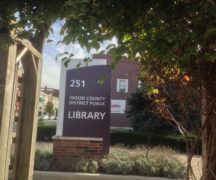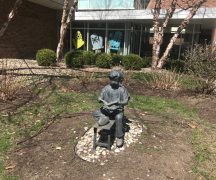By DAVID DUPONT
BG Independent News
Even before his microphone was turned on, Paterson Joseph let the audience at the Wood County District Public Library know they were in for a show.
As he stepped to the lectern, Joseph’s baritone sang out, greeting those assembled. Then he was affixed with his microphone. Unneeded maybe given his booming voice, but an assurance that everyone would be able to hear him clearly.
Joseph visited the library earlier this month to discuss his first novel “The Secret Diaries of Charles Ignatius Sancho.” The book is a chapter in his life of discovery.
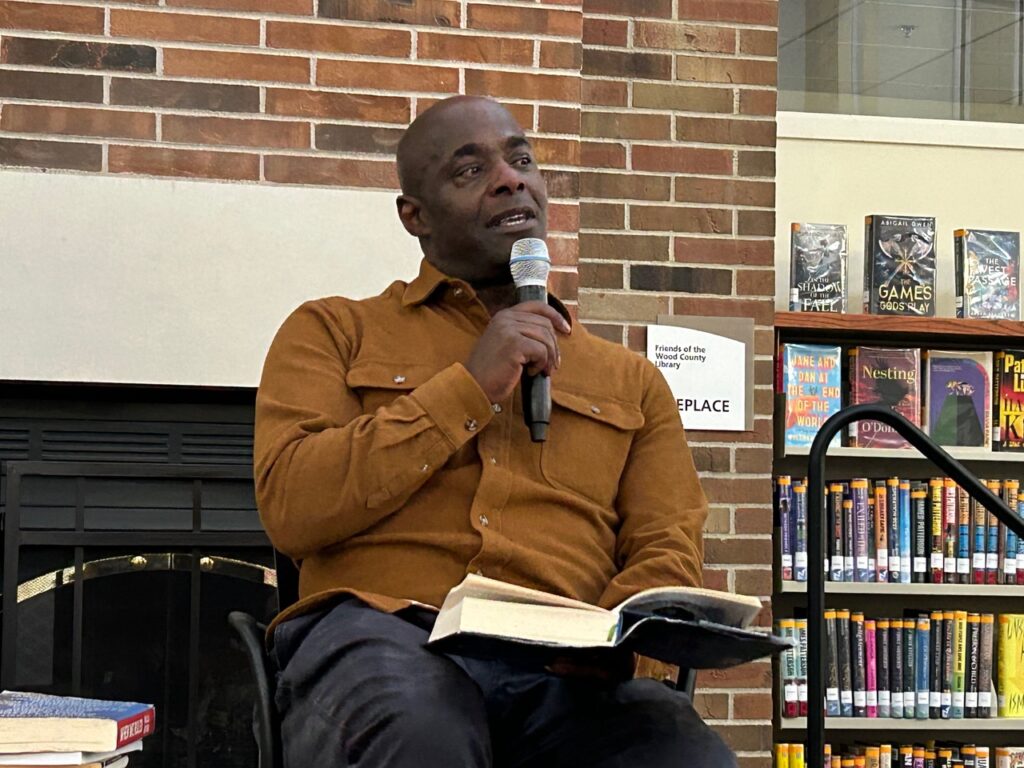
Now 60, Joseph was born in a working class neighborhood in London. His parents had immigrated from Santa Lucia in the Caribbean. They were part of the Windrush generation, an influx of Caribbeans who came to England to help rebuild the country after World War II.
Despite this they were not welcomed by some residents. Racist graffiti was written on the walls, including the statement “Keep Britain white.”
Joseph explained : “That sign I kept seeing coincided with the Keep Britain Tidy campaign of the 1970s, so I thought it was a government message, that everybody thought we shouldn’t be here, and we didn’t really know why we were here. It’s a strange thing to grow up in that way.”
The educational system considered immigrants like him as well as the Irish and other working class kids “educationally subnormal.”
So when he entered the equivalent of high school, he was told by a friend that all he had to do was sign in, and then “bunk off.”
So for two years, he played truant, spending his time at the public library. “Libraries are so important to me. I used to hide in the reference section.”
He read everything — the classics, including Oscar Wilde, all the mysteries by Agatha Christie, and the romances “for discerning ladies” published by Boon & Mills. Those were “rubbish” but it was words, sometimes salacious, thus appealing to a 13-year-old boy.
Joseph loved words, not just on the page, but spoken in various accents. All of which was helpful when he decided to be an actor.
He had a successful career on television, screen, and on stage. He was a member of the Royal Shakespeare Company. He noted that the first time he came to America was to be in a Broadway staging of “Hamlet” with Ralph Fiennes in the title role. (Joseph played Hamlet’s friend Horatio.)
Still he sometimes found roles limited because, he was told, there weren’t people like him in Britain until 1948.
At 18 , he had started writing but he hid it, all too aware of his status as “educationally subnormal.”
At 35, though, he decided to find historic figures, who, like him, were Black and English. People he could portray on stage. This was pre-internet so he searched for books.
“I want to find this history, but I’m not a fool,” he said.
He checked his sources to make sure the claims were not fanciful. He found Lucius Septimius Severus, born in present day Libya, who rose to become Roman Emperor, and eventually came to Britain. Despite its vast empire, the Romans “can’t tame, this dirty, stinking rock in the middle of the channel.” Severus led a campaign against the Scots, “these wild tribes who would not be tamed.” He died of disease before the final victory, but his sons completed the task and succeeded him as emperor.
During these searches he came upon a print of a portrait by Thomas Gainsborough. With a bright red waistcoat and his hand thrust inside, the subject gives the impression of being a man of leisure. But he was not.He was born on a slave ship. He was the valet of the Duke of Montagu, one of the most powerful men in Britain. This was Charles Ignatius Sancho.
The painting is a performance, Joseph said. “What would a black man educated and not treated as educationally subnormal, achieve if he was allowed to? He could look like this.”
The duke had taught Sanchez to read and write. Sanchez put those tools to good use writing letters calling for the abolition of the slave trade.
At this time, 1748, Britain had a monopoly on cross Atlantic trafficking in enslaved humans.
When Sanchez left Montagu’s service, maybe because of problems with his weight, he became a shop owner. He wrote prolifically — art reviews, abolitionist commentary, letters, and a diary.
Joseph wrote and performed a one-person play about Sancho, and more recently did a radio special about Septimius Severus.
The pandemic gave him the time off from the stage to write the novel, “The Secret Diaries of Charles Ignatius Sancho.”
“So I’m in the midst of sinking a submarine for the BBC on a show called ‘Vigil,’ and lockdown happens. We have to stop, and we’re not starting again, I know for about three months.”
He knew now he had the time to write the book. The earlier play was 75 minutes long, and he knew he had more to say, especially given the research he’d continue to do.
“I’m panicking because I work a lot as an actor with my day job,” he said, “but I know I’ll never have time to write a novel. I’d want to do it now. So I did.”
He builds the book from Sancho’s diaries and his letters. “These are great letters by the way, very witty, very, very funny.” Like the portrait they are a performance.
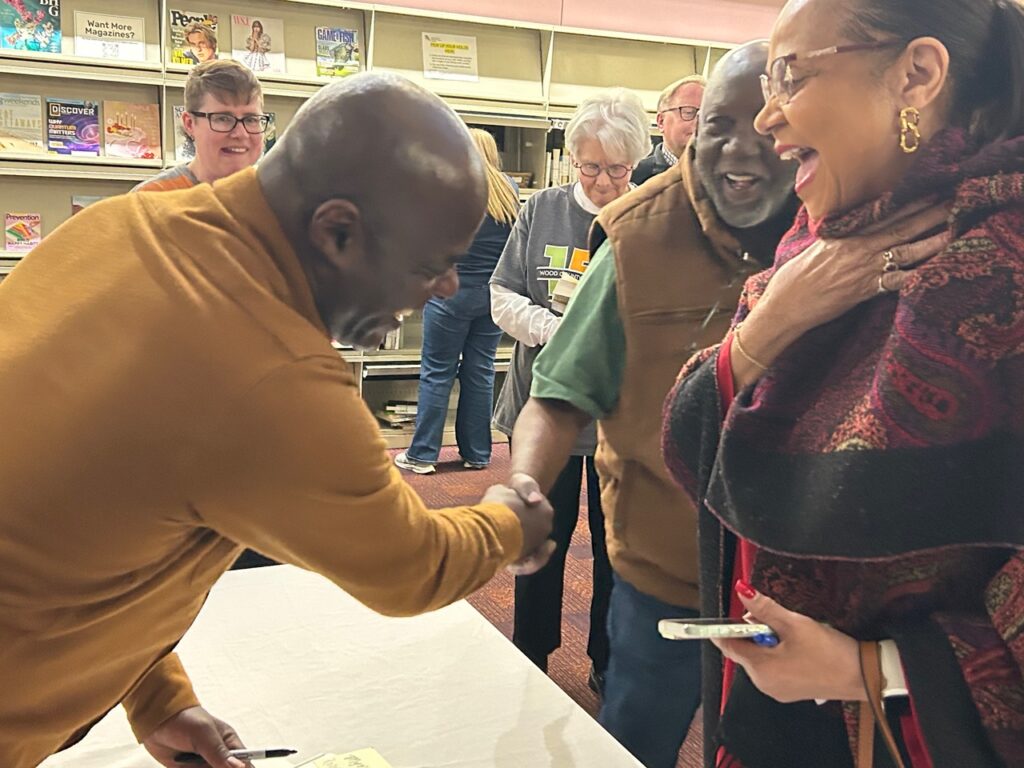
Sanchez also wrote music — hops, lively jigs and reels played in the equivalent of dive bars.
Fitting then that the library staff brought him to Howard’s Club H on Wednesday night to hear TheDive Bombing Space Pigeons, and the next night after his reading, he was back for more music, dance and drink with the Joe Baker Band on stage.
Joseph clearly was enjoying his time in Bowling Green, making unexpected connections.
In the front row during his talk was Simon Morgan-Russell, who is British, and teaches English with a specialty in Shakespeare as well as being dean of the Honors College.
On learning this, Joseph said he would refer any questions he couldn’t answer to him.
Then later while answering questions from the audience, he met Arne Spohr, a musicologist, who not only knew of Sanchez music, but has directed performances of it with the BGSU Early Music Ensemble.
The music is strange, Joseph said. “It’s not what you’d expect from someone who knows what he knows about what’s happening to other black people in the world.”
In writing the novel, he drew on a drama technique called “hot-seating” where the actor must sit and probe what is going on inside the person they will portray as they face the conflicts within a story.
“Sancho has an inner life like Julius Caesar has an inner life. He was a real person who walked around,” he said.
The performer must put aside the book whether it’s a Shakespeare play or the New Testament , and contemplate what the character is experiencing inside.
“Strange, strange, my dad died two weeks ago,” he said as he demonstrated the technique. “I was wearing funeral clothes two weeks ago and now I’ve got to dress up for a wedding, and they’re asking me, ‘oh, why are you melancholy, Hamlet? Why are you melancholy?’”
Then he slipped into “to be or not to be.” The familiar soliloquy flowed from him, in a melodious voice.
“You’re inside Hamlet now,” he said.
Then Joseph read the opening passage from his novel. Now his listeners in Bowling Green were inside the complex psyche of Charles Ignatius Sancho.

